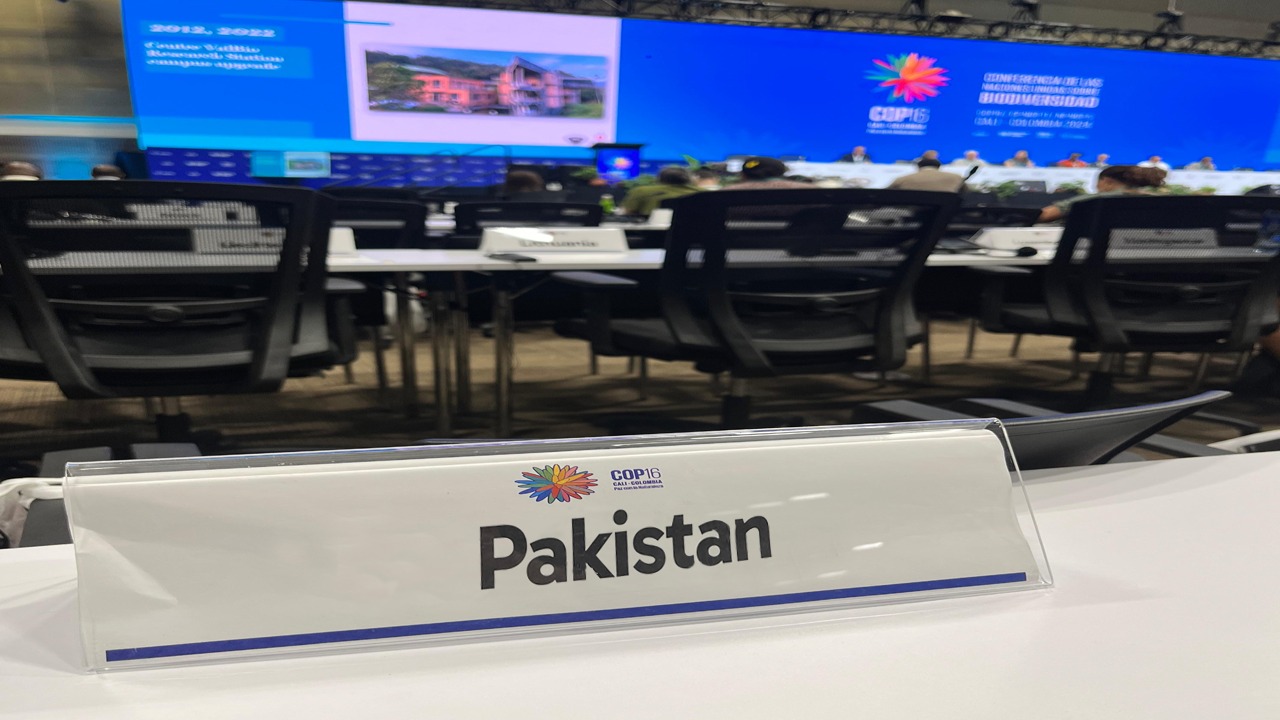You may have heard about the Climate Change COP (Conference of Parties), where nations meet to tackle climate issues—a well-known event in our region. But did you know there’s another, lesser-known COP?
The Convention on Biological Diversity (CBD) COP, the largest global biodiversity conference, will end in Cali, Colombia. Unfortunately, it has yet to make headlines in Pakistan. Is this another national security matter? Not quite. It is a case of low governmental interest, so much so that only one delegate, Naeem Ashraf Raja, director of the Biodiversity Programme at the Ministry of Climate Change, represents Pakistan.
In stark contrast, India has sent over ten representatives, and its Minister of State for Environment, Forest, and Climate Change, Kirti Vardhan Singh, also visited on Wednesday and launched its updated NBSAPs in a side event, a move that garnered diplomatic attention.
The Maldives has five delegates, and their minister also visited. Sri Lanka has three, Bangladesh has seven, Iran has three, Bhutan has nine, and Nepal is represented by six, including its ministry.
As many as 110 ministers from different states and six heads of state from other nations demonstrated the political weight placed on biodiversity at COP16, which Pakistan missed badly.
What is the CBD COP?
The CBD emerged from the 1992 Rio Earth Summit, where 150 countries, including Pakistan, signed a treaty to protect biodiversity and use resources equitably. This led to national Biodiversity Action Plans, including Pakistan’s in 1999. However, the initial plans largely overlooked the welfare of marginalized groups like women, Indigenous people, and local communities, and the 2010 targets set under the CBD weren’t met globally, according to the Global Biodiversity Outlook (GBO3) report.
In 2010, the CBD COP in Japan established the Strategic Plan for Biodiversity 2011-2020, creating the Aichi Biodiversity Targets (ABTs), with goals to be achieved by 2020. Nations, including Pakistan, used these targets to draft their second National Biodiversity Action Plan (NBSAP) for 2017-2030.
New Challenges in Biodiversity Loss
In 2022, the fifth Global Biodiversity Outlook report highlighted worsening biodiversity loss, with one million species now at risk of extinction, and warned of severe consequences if no action is taken. COP15 saw nations adopt the Kunming-Montreal Global Biodiversity Framework (KMGBF) to respond to these concerns. This framework envisions a world living in harmony with nature by 2050 and includes four main goals to be met by 2050 and 23 targets to be met by 2030.
The KMGBF requires countries to update their NBSAPs with targets aligned to the framework. As of now, 44 nations have done so, including regional neighbours like China, India, Iran, and Afghanistan. Pakistan, however, has yet to submit its updated NBSAP, with plans only anticipated by December.
Pakistan’s Representation at COP16: An Undersized Delegation
COP16 includes intense discussions over two weeks, with daily working group meetings running from early morning until late at night. Each working group addresses different agenda items, like funding for developing nations to biodiversity protection and wildlife management.
Most countries send sizable delegations—10 or more representatives—to effectively participate in all discussions. Pakistan, however, has only one government delegate at COP16..
While other countries use COP to network with donors and secure biodiversity funding, Pakistan’s limited presence—without ministerial support—raises questions about its commitment to biodiversity restoration.
The Citizenry reached out to Romina Khurshid Alam , Coordinator to the Prime Minister on Climate and Environmental Coordination through her secretary Aleeza Sauleh, but was not provided any reason for such thin representation of Pakistan in the COP16 and Alam’s absence.
Header image by Oonib Azam
This story was produced as part of the 2024 CBD COP16 Fellowship organized by Internews’ Earth Journalism Network.



